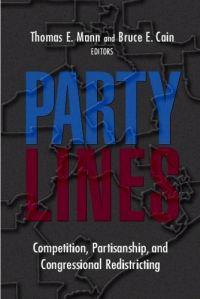

Purchase
Competition, Partisanship, And Congressional Redistricting
Brookings Institution Press
November 2005
125 pages
ISBN: 0815754671
Trade Size
Add to Wish List
Non-Fiction
The legitimacy of the American electoral system depends on
sustaining reasonable levels of fairness, accountability,
responsiveness, and common sense. Recent Congressional
elections fly in the face of those requirements, however,
with a startling lack of competition, growing ideological
polarization, and a fierce struggle between the parties to
manipulate the electoral rules of the game. Party Lines
addresses these problems head on in an authoritative and
timely analysis of redistricting in the United States
The practice of state legislatures redrawing district lines
after the decennial census has long been a controversial
aspect of our governing system. Recent developments have
added new urgency to earlier debates. The sorry spectacle
of mid-decade partisan gerrymandering in Texas renewed
public attention to the potential problems of
redistricting, reinforcing the view that it is unfairly
dominated by self-serving elected officials and parties.
The perfunctory character of Congressional elections is
another growing problem: in 2002, only four House
incumbents were defeated in the general election, the
lowest in American history. Despite a hotly contested
presidential contest in 2004, that number increased by only
three. In Party Lines, eminent political analysts explain the
legal and political history of redistricting since the one
person–one vote revolution in the 1960s and place it in the
larger context of American politics. The authors document
the impact of redistricting on competition, polarization,
and partisan fairness, and they assess the role technology
played in the redistricting process. The final chapter
analyzes options for reform, including most importantly the
use of independent redistricting commissions as an
alternative to the normal state legislative process.
Redistricting reform is no panacea but it is a start toward
ensuring that American voters still have the largest say in
who will represent them Contributors include Micah Altman (Harvard Universtity),
Bruce Cain and Karin MacDonald (University of California,
Berkeley), Cherie Maestas (Florida State University), L.
Sandy Maisel (Colby College), Thomas Mann (Brookings
Institution), Michael McDonald (George Mason University),
Nathaniel Persily (University of Pennsylvania ), and Walter
Stone (University of California, Davis).
Comments
No comments posted.
Registered users may leave comments.
Log in or register now!
| 


 © 2003-2024 off-the-edge.net
all rights reserved Privacy Policy
© 2003-2024 off-the-edge.net
all rights reserved Privacy Policy